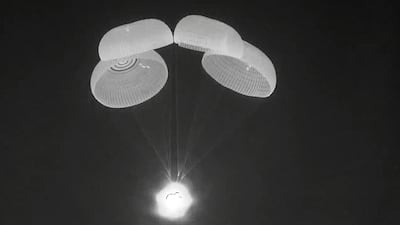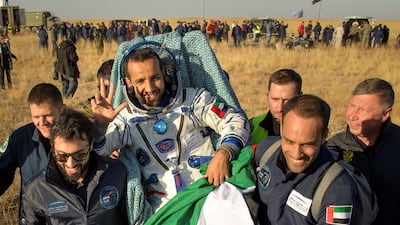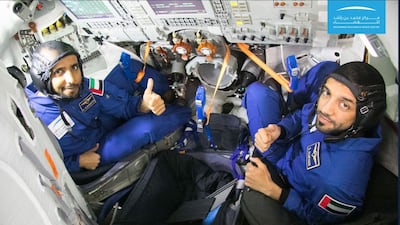Successful UAE astronaut Sultan Al Neyadi has told The National he is hopeful the country will join Nasa’s efforts in sending humans to the Moon.
Dr Al Neyadi, who is set to embark on the Arab world’s first long-duration space mission on February 26, said the country’s space programme would follow “wherever humanity is going”.
Nasa has introduced Artemis, an ambitious project that aims to build a sustainable presence of astronauts in lunar orbit and on the Moon's surface.
It is crucial for the space agency to find capable international partners to help meet the budgetary and timetable demands involved in building the Lunar Gateway — an orbiting station to house astronauts.
“The UAE, I think, is going wherever the humanity overall is going,” Dr Al Neyadi, who will participate in a six-month mission to the International Space Station next month, told The National in an interview on Thursday.
“We all have the support from our leadership and hopefully they will commit to this programme — the Artemis.
“We're looking towards, hopefully in the future, seeing an astronaut probably orbiting or even landing on the lunar surface.”
The National last month revealed the UAE could be contributing an airlock module — an airtight room through which astronauts would enter and exit the space station — to the Lunar Gateway.
Nasa’s Artemis 1 test flight — the first of many missions planned under the programme — was launched to the Moon and landed back on Earth successfully.
It was a crucial step forward for the space agency, which hopes to land astronauts on the Moon before the end of the decade.
“We also saw the successful Artemis 1 launch, it was a great proof of concept,” said Dr Al Neyadi.
“Soon we'll have some people on board the Orion capsule and, definitely, the UAE will try to be a part of that.
“We all know that the UAE has signed the Artemis Accords and it's a matter of an opportunity.”
The Accords is a Nasa-led international agreement that outlines peaceful exploration of the Moon and signatories include Saudi Arabia, Bahrain and Israel.
The UAE’s newest astronauts Nora Al Matrooshi and Mohammed Al Mulla, who could be in line for a Moon mission, are training alongside the Artemis team at the Johnson Space Centre in Houston, Texas, after an agreement between the Mohammed bin Rashid Space Centre and Nasa to offer them basic instruction.
UAE and Nasa officials have also held talks on the Artemis programme, although a deal has yet to be signed.
Of his ISS mission starting next month, Dr Al Neyadi said: "I think this is a natural progression towards human space flight and that's why we are committed to this six-month mission.
"After a very successful mission in 2019, when my colleague Hazza [Al Mansouri] went to space, that was a big boost for the space programme overall.
"I remember going to schools and universities and even talking to everyday people and they all ask about space.
"They have questions about the missions and what it's like to be living in space and on board the station."












